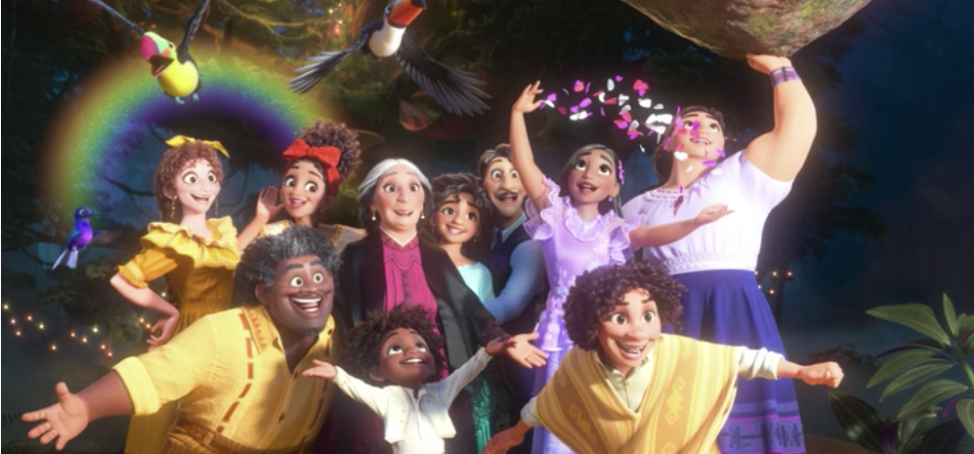Let’s Talk About Bruno- A Review Of Disney’s Encanto
By Nitya Sharma and Anya Patri
[spoiler alert]
Let’s talk about Bruno— Disney’s latest release, Encanto, has achieved Frozen levels of success, with its hit song, “We Don’t Talk About Bruno,” topping the Billboard Hot 100, surpassing Adele, Ed Sheeran, and Justin Bieber. However, the movie has far more to offer than its soundtrack. Encanto is Disney at its prime, melding magical elements and a cast of gifted yet relatable characters with vibrant animations and a universal message that any movie-goer can relate to.
Encanto begins with a miracle given to the matriarch of the Madrigal family in a time of need, blossoming into a safe haven for her to live in. However, this blessing comes with its fair share of vices; as time passes, the enchantment begins to grow weaker and their house, the casita, begins to fall apart. Mirabel, the black sheep of the family, resolves to save the magic and finally prove that she is just as special as everyone around her. The film tells a story that is filled with magic and wonder while being grounded in the reality of family dynamics and the pressure of others’ expectations that is so fundamentally human.
To a child, Encanto may just be an exciting, colorful movie, filled with catchy sing-a-longs. To a semi-adult, however, there is much to be gleaned from the film. Encanto differs from previous Disney movies in a couple of key ways. Firstly, there is no obvious villain. Think the Huns from Mulan, Mother Gothel from Tangled, Scar from The Lion King— there is nothing comparable in Encanto. Even the Madrigal family’s waning magic cannot be attributed to some mystical evil force, but rather, to the tremendous weight of family expectations and the lasting implications of generational trauma. Secondly, the central plot of Encanto exists on an unusually small scale. Unlike other Disney movies, the main conflict does not have implications that will cause the world to burn or an empire to crumble. Instead, the plot focuses solely on the Madrigal family, using the cracks in the family home and the diminishing light of the candle as a metaphor for the weakening magic miracle. The miracle itself symbolizes family, and as tensions within the family grow, the potency of the magic wanes.

Visually demonstrating the small scale of the plot is the fact that the entire movie takes place within the Madrigal home. The writers of Encanto make this point crystalline to the audience when it is revealed that Tio Bruno has been living in the walls of the house for years, a clever twist on the saying “If the walls could talk.” It is only fitting then that the plot reaches its peak at the dinner table, where the entire family (even Tio Bruno, from behind the wall), eats together every night. What was supposed to be a joyous evening turns sour when the truth of Tio Bruno’s vision is revealed to all. As Abuela’s anger grows, so too do the cracks in the wall. Eventually, Mirabel and her grandmother reach a deadlock in the main room of the home, and Mirabel voices the words the rest of her family have been too afraid to speak: “I will never be good enough for you.” Her words cause the walls, the floors, even the windows to come alive, and the ground splits, creating a physical divide between Mirabel and her grandmother. The divide symbolizes the moment the family truly fractures, and the house consequently crumbles.
Abuela’s moment of reckoning is the turning point for the family, as it brings the realization that fear and trauma cannot rule our lives, but that love and intimacy must drive our actions. The closing scene, featuring the rebuilding of the home, symbolizes the Madrigal’s starting from scratch, moving on from their trauma, and building their family back together again.
Each character in Encanto is multi-faceted and faces their own struggle to find their place in the family. The protagonist, Mirabel, is optimistic and plucky, but she is stuck in the difficult position of being the only member of her family with no gift. Mirabel is a tremendously relatable character to those who often feel overshadowed by family members, and despite her lack of magical powers, her wit and charisma make her a compelling character. She is special just the way she is, but the lack of acceptance from the people around her is the reason for a lot of her personal turmoil. Her journey is one of self-acceptance and learning how to value herself as an individual, which is an important message for a young audience.
Mirabel’s sister, Isabella, is another side of the same coin. Her gift is growing flowers, but she is also the embodiment of “perfection;” she is poised, charming, and acts in a classically Disney-princess fashion– everything Mirabel is not. However, Isabella suffers the pitfalls of being the family favorite, the one put on a pedestal and can do no wrong. The expectation of perfection from those around her leads to her doing things that others want (like marrying Mariano, who she does not love) instead of the things that she truly loves. Her perfection is a facade, and by the end of the film, she embraces her imperfections.

Luisa, Mirabel’s eldest sister, is gifted with Herculean strength and helps the people around the village with their work. However, her burden is one of familial pressure. In her kinetic song, Surface Pressure, Luisa lets out her anxieties and realizes that she needs to take a break and allow herself to relax. She is very relatable in terms of internal pressure and burnout, which a lot of teens and young adults struggle with, and she finally learns to take a break and not carry the weight of the world on her shoulders.
The other characters in Encanto are similarly complex; Bruno loves his family, but realizes that his presence isn’t helping them or making them happy despite his best efforts. Abuela is a character representative of a lot of parents or guardians—she has her family’s best interests at heart, but she doesn’t express it often and takes their efforts for granted, which leads to the cracks in the casita and the Madrigal family as a whole.
Encanto is a beautifully symbolic film that explores themes of family, pressure, and the feeling of not fitting in. With every character having nuance and emotional depth, the movie is incredibly compelling, and rooting for the family is inevitable. Even the casita has personality, and the music and animation truly bring everything to life in a colorful and vivid way. Encanto is a fun and thought-provoking movie that is enjoyable for everyone, with a takeaway for both parents and children about the importance of family and self-acceptance.


OH MY GOD, zoe kravitz is so FINE. sorry this was irrelevant to the article but I just HAD to share this information.